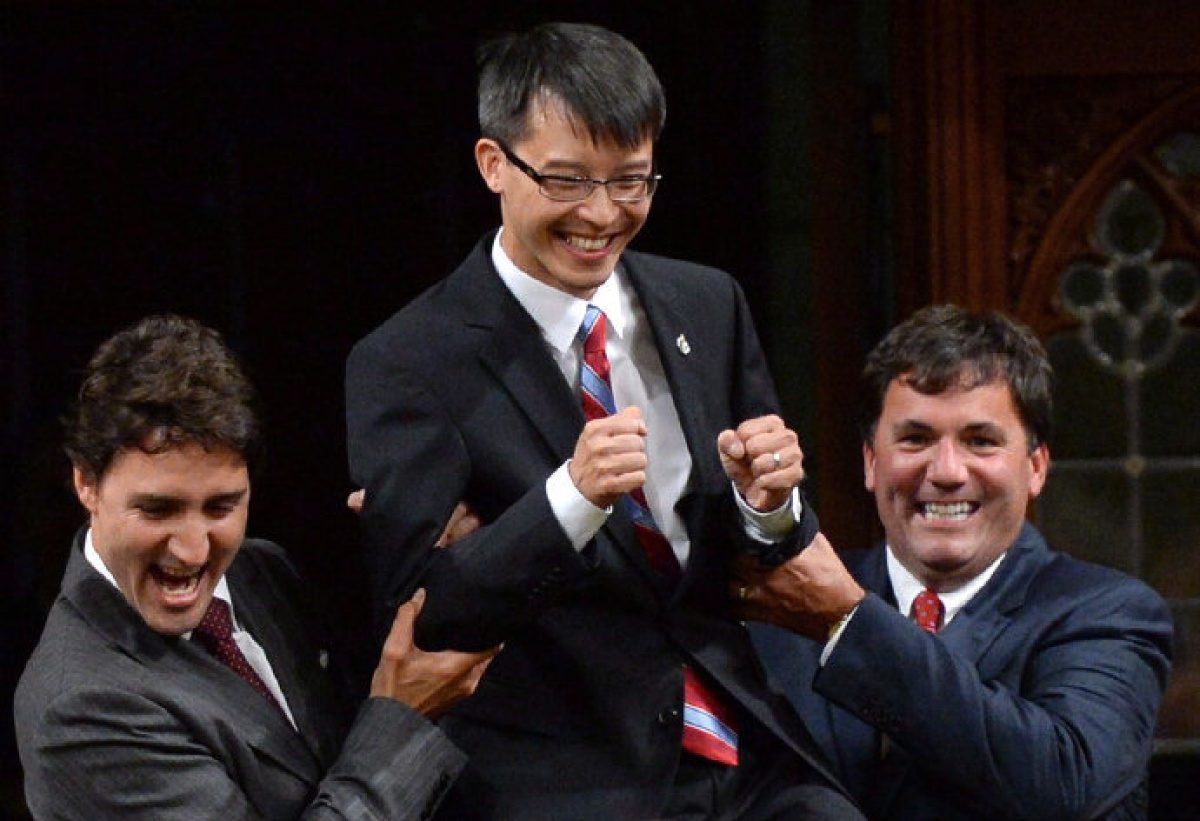On Monday afternoon, Liberal MP Arnold Chan got up in the House of Commons to deliver what sounded very much like a farewell speech. Chan, who has been suffering from a renewed bout of cancer, had his family in attendance as he offered a love letter to the institution of parliament, and an exhortation to his fellow MPs that it was time to start treating the place with the respect that it deserves, as well as treating one another with greater respect. While Chan has not announced that he would be resigning his seat, he did say that he wasn't sure how many more twenty-minute speeches he would be able to give, and there was a note of finality to his comments.
Among the points that Chan made about respect and reverence for Parliament and democracy going so far as to praise Green Party leader Elizabeth May for her dedication and constant reminders that MPs follow those rules in the Standing Orders about not speaking disrespectfully about one another was perhaps the most important point of all, which is about the need for parliament to get away from the "canned talking points" that have been hobbling our debates.
"I am not perfect," Chan said. "I know that sometimes it takes some practice. There are instances where it is necessary for us to have the guidance and assistance of our staff, the ministries, and of our opposition research. However, I do not think it gives Canadians confidence in our debates in this place when we formulitically repeat those debates. It is more important that we bring the experience of our constituents here and impose it upon the question of the day, and to ask ourselves how we get better legislation, how we make better laws."
He's right in many cases, MPs haven't been practicing the art of giving a speech on their feet. But part of the problem is the twenty-minute speech rule has created a culture where we are using prepared speeches to fill that time rather than allowing more spontaneous debate. The need to stick to talking points exacerbates this problem, and yes, it becomes a formula.
"We can disagree strongly, and in fact we should," Chan added. "That is what democracy is about. However, we should not just use the formulitic talking points. It does not elevate this place. It does not give Canadians confidence in what democracy truly means."
That is very much what has happened in our parliament, where debate has been replaced with speechifying, which is further exacerbated by speaking lists that have removed any and all spontaneity from the Chamber. Speechifying is usually (but not always) more about House Duty than it is about caring about a topic.
A few weeks ago, when Conservative MP Michelle Rempel alerted her followers over Twitter about her slated speaking time in a debate, I remarked how the fact that it could be timed so precisely was indicative of the problems with debate under our current rules. While she became indignant about the suggestion that she was merely reading points given to her (which I wasn't suggesting I know that she's one of the better MPs who does her own homework), a number of her followers came after me about what was wrong with MPs giving "well-researched speeches" to Parliament about important issues.
But the problem isn't the research it's that speeches aren't debate. While Rempel may be one of the exceptions to the rule when it comes to listening to previous speakers and incorporating or reacting to what they say, vanishingly few MPs do. When it comes to the few minutes allotted for questions and comments at the end of a speech, most of the time it's either an opposing MP giving their own canned talking point on the subject, or worse yet, a fellow members of that MP's own party who is just looking to get an approved talking point reiterated. This is not debate, and it debases Parliament, as Chan points to.
Part of the problem is the way in which the rules around speaking times codified the need to fill time rather than engaging in substantive debate. Parliamentary blogger Radical Centrist (@procedurepols) went digging into the history of this after my column on the problem we have with debate management in this country, and found that once the rules were changed to limit speaking times to forty minutes in 1927, MPs began using their notes to fill up those forty minutes. Cut-and-thrust was squelched, and in 1982, they changed the rules to limit speeches to twenty minutes with the added ten minutes for questions and comments in an attempt to bring back cut-and-thrust. That too has failed.
If this current parliament is looking to honour Chan and his reverence for our Parliament, then it's time to start making a radical restoration to the way we govern our debates. That means restoring the old Speaker's ruling about not allowing scripts with very few exceptions (like replies to a Speech from the Throne or budget speeches), and notes only being used for technical terminology. It means getting rid of the speaking lists so MPs need to catch the Speaker's eye if they want to speak, and it means loosening the clock so that they don't feel the need to fill those twenty minutes, but rather can speak extemporaneously on a topic for six to eight minutes, with room in there for interruption for the purposes of debate and "cut-and-thrust," as they still do in Westminster (and to a certain extent in the Canadian Senate). But above all, we need to get away from the need to always sell the party message, the branded slogan on each issue that otherwise ensure that debates are simply sponsored content rather than substantive dialogue. Only then can we start to get back to actually debating the issues that matter, rather than selling messages with clips destined for YouTube.
Photo Credit: Toronto Star






